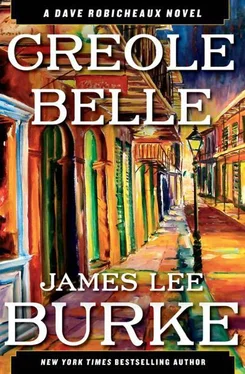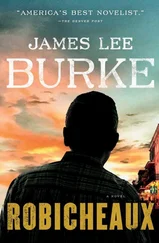James Burke - Creole Belle
Здесь есть возможность читать онлайн «James Burke - Creole Belle» весь текст электронной книги совершенно бесплатно (целиком полную версию без сокращений). В некоторых случаях можно слушать аудио, скачать через торрент в формате fb2 и присутствует краткое содержание. Жанр: Криминальный детектив, на английском языке. Описание произведения, (предисловие) а так же отзывы посетителей доступны на портале библиотеки ЛибКат.
- Название:Creole Belle
- Автор:
- Жанр:
- Год:неизвестен
- ISBN:нет данных
- Рейтинг книги:3 / 5. Голосов: 1
-
Избранное:Добавить в избранное
- Отзывы:
-
Ваша оценка:
- 60
- 1
- 2
- 3
- 4
- 5
Creole Belle: краткое содержание, описание и аннотация
Предлагаем к чтению аннотацию, описание, краткое содержание или предисловие (зависит от того, что написал сам автор книги «Creole Belle»). Если вы не нашли необходимую информацию о книге — напишите в комментариях, мы постараемся отыскать её.
Creole Belle — читать онлайн бесплатно полную книгу (весь текст) целиком
Ниже представлен текст книги, разбитый по страницам. Система сохранения места последней прочитанной страницы, позволяет с удобством читать онлайн бесплатно книгу «Creole Belle», без необходимости каждый раз заново искать на чём Вы остановились. Поставьте закладку, и сможете в любой момент перейти на страницу, на которой закончили чтение.
Интервал:
Закладка:
“Sir, do you have someone here to help you?” I asked.
“There ain’t no he’p for what I got. I was at Carville eighteen years. I t’ink I scared that deputy. He wouldn’t shake hands wit’ me.”
“You have Hansen’s disease?” I said.
“ That and everyt’ing else.” For the first time he smiled, his eyes full of light.
“Tee Jolie told me she was living with a man I know,” I said. “She mentioned centralizers. I think this man might be in the oil business. Does any of this sound familiar?”
“No, suh, it don’t.” He had sat down in a straight chair, a photograph of a World War I doughboy hanging behind him. A framed color picture of Jesus, probably cut from a magazine, hung from the opposite wall. The rug was frayed into string along the edges; a moth swam in the glow of the reading lamp. Outside, in the rain, I could see the green and red running lights on a passing barge, the waves from the bow slapping into the elephant ears. He added, “She had a scrapbook, though.”
“Sir?” I said.
“In her room. You want me to get it? It’s got a mess of pictures in there.”
“Don’t get up, sir. With your permission, I’ll go into her room and get it.”
“It’s there on her li’l dresser. She was always proud of it. She called it her ‘celebrity book.’ I tole her, ‘There ain’t no celebrities down here, Tee Jolie, except you.’ She’d say, ‘I ain’t no celebrity, Granddaddy, but one day that’s what I’m gonna be. You gonna see.’”
He looked wistfully into space, as though he’d said more than he should have and had empowered his own words to hurt him. I went into Tee Jolie’s bedroom and found a scrapbook bound in a thick pink plastic cover with hearts embossed on it. I sat back down on the couch and began turning the pages. She had cut out several newspaper articles and pasted them stiffly on the pages: a story about her high school graduation, a photograph taken of her when she was queen of the Breaux Bridge Crawfish Festival, another photo that showed her with the all-girl Cajun band called BonSoir, Catin, a picture of her with the famous Cajun fiddler Hadley Castille.
Among the back pages of the scrapbook was a collection of glossy photographs that she had not mounted. Nor were they the kind that one finds in a small-town newspaper. All of them appeared to have been taken in nightclubs; most of them showed her with older men who wore suits and expensive jewelry. Some of the men I recognized. Two of them were casino people who flew in and out of New Jersey. One man ran a collection agency and sold worthless insurance policies to the poor and uneducated. Another man operated a finance company that specialized in title loans. All of them were smiling the way hunters smiled while displaying a trophy. In every photo, Tee Jolie was dressed in sequined shirts and cowboy boots or a charcoal-black evening gown with purple and red roses stitched on it. She made me think of a solitary flower placed by mistake among a collection of gaudy chalk figures one takes home from an amusement park.
In one photograph there was a figure I did not expect to see in Tee Jolie’s scrapbook. He was standing at the bar behind the main group, wearing a dark suit with no tie, the collar of his dress shirt unbuttoned, a gold chain and gold holy medal lying loosely around his neck, his scalp shining through his tight haircut, his eyebrows disfigured by scar tissue, his mouth cupped like a fish’s when it tries to breathe oxygen at the top of a tank. I handed the photo to Clete for him to look at. “Do you know who Bix Golightly is?” I asked Mr. DeBlanc.
“I don’t know nobody by that name.”
“He’s in this photo with Tee Jolie and some of her friends.”
“I don’t know none of them people, me. What’s this man do?”
“He’s a criminal.”
“Tee Jolie don’t associate wit’ people like that.”
But she does associate with people who use other people, I thought. I took the photo from Clete and showed it to Mr. DeBlanc. “Take a good look at that fellow. Are you sure you haven’t seen him?”
“No, suh, I ain’t seen him, and I don’t know him, and Tee Jolie never talked about him or any of these men. What kind of criminal are we talking about?”
“The kind of guy who gives crime a bad name,” I replied.
His face became sad; he blinked in the lamplight. “She tole me she was falling in love wit’ a man. She said maybe she’d bring him home to meet me. She said he was rich and had gone to col’letch and he loved music. She wouldn’t tell me nothing else. Then one day she was gone. And then her sister left, too. I don’t know why this is happening. They left me alone and never called and just went away. It ain’t fair.”
“What isn’t fair?” Clete asked.
“Everyt’ing. We never broke no laws. We took care of ourself and our place on the bayou and never hurt nobody. That’s my father’s picture up there on the wall. He fought in France in the First World War. His best friend was killed on the last day of the war. He had eight children and raised us up against ever fighting in a war or doing harm to anybody for any reason. Now somebody taken my granddaughters from me, and a deputy sheriff tells me ain’t no evidence of a crime been committed. That’s why I say it ain’t fair.” He struggled to his feet with his two walking canes and went into the kitchen.
“What are you doing, sir?” I asked.
“Fixing y’all coffee.”
“You don’t need to do that.”
“Yes, suh, I do. I ain’t been a good host. I cain’t find the sugar, though. I couldn’t find it this morning. I cain’t concentrate on t’ings like I used to.”
I had followed him into the kitchen to dissuade him from putting himself out. The cupboards, which had curtains on them rather than doors, were almost bare. There were no pots on the stove, no smell of cooked food in the air. He pulled a coffee can off a shelf, then accidentally dropped it on the drainboard. The plastic cap popped loose, spilling the small amount of coffee that was inside. “It’s all right. We still got enough for t’ree cups,” he said.
“We have to go, Mr. DeBlanc. Thank you for your courtesy,” I said.
He hesitated, then began scooping the coffee back in the can. “Yes, suh, I understand,” he replied.
Clete and I walked out into the rain and got into the Caddy. Clete didn’t start the engine and instead stared through the windshield at the lamplight glowing in the front windows of the house. “His kitchen looked pretty bare,” he said.
“I suspect he’s in the Meals On Wheels program,” I said.
“You ever see the stuff those old people eat? It looks like diced rabbit food or the kind of crap Iranian inmates eat.”
I waited for him to continue.
“You think Mr. DeBlanc might like a warmed-up po’boy and a cold brew?” he said.
So we took Clete’s foot-long sandwich, which consisted of almost an entire loaf of French bread filled with deep-fried oysters and baby shrimp and mayonnaise and hot sauce and sliced lettuce and tomatoes and onions, and carried it and the two longneck bottles of Bud inside. Then we fixed a pot of coffee and sat down with Mr. DeBlanc at his kitchen table and cut the po’boy in three pieces and had a fine meal while the rain drummed like giant fingers on the roof.
Alice Werenhaus lived in an old neighborhood off Magazine, on the edges of the Garden District, on a block one might associate with the genteel form of poverty that became characteristic of mid-twentieth-century New Orleans. Even after Katrina, the live oaks were of tremendous dimensions, their gigantic roots wedging up the sidewalks and cracking the curbs and keeping the houses in shadow almost twenty-four hours a day. But gradually, the culture that had defined the city, for good or bad, had taken flight from Alice’s neighborhood and been replaced by bars on the windows of businesses and residences and a pervading fear, sometimes justified, that two or three kids dribbling a basketball down the street might turn out to be the worst human beings you ever met.
Читать дальшеИнтервал:
Закладка:
Похожие книги на «Creole Belle»
Представляем Вашему вниманию похожие книги на «Creole Belle» списком для выбора. Мы отобрали схожую по названию и смыслу литературу в надежде предоставить читателям больше вариантов отыскать новые, интересные, ещё непрочитанные произведения.
Обсуждение, отзывы о книге «Creole Belle» и просто собственные мнения читателей. Оставьте ваши комментарии, напишите, что Вы думаете о произведении, его смысле или главных героях. Укажите что конкретно понравилось, а что нет, и почему Вы так считаете.












